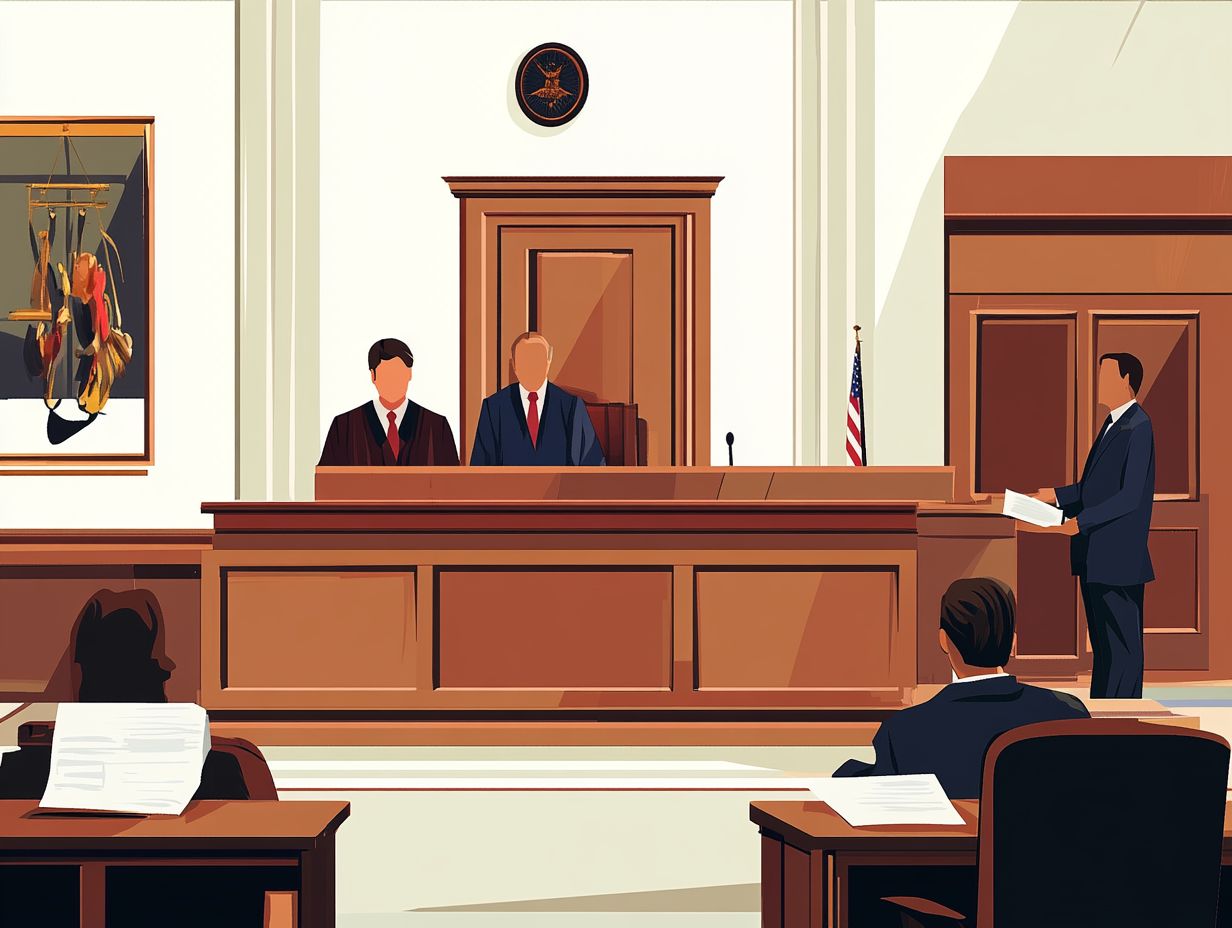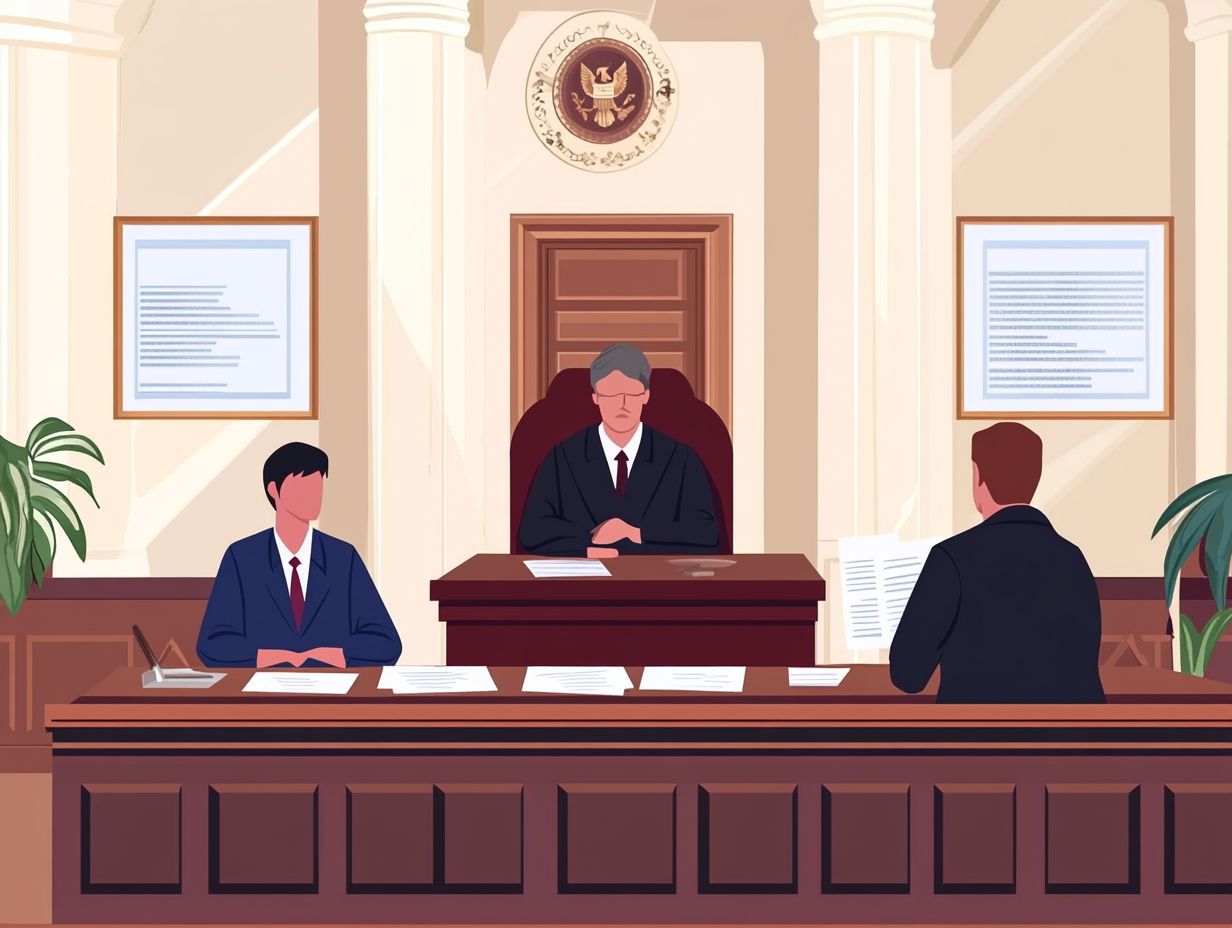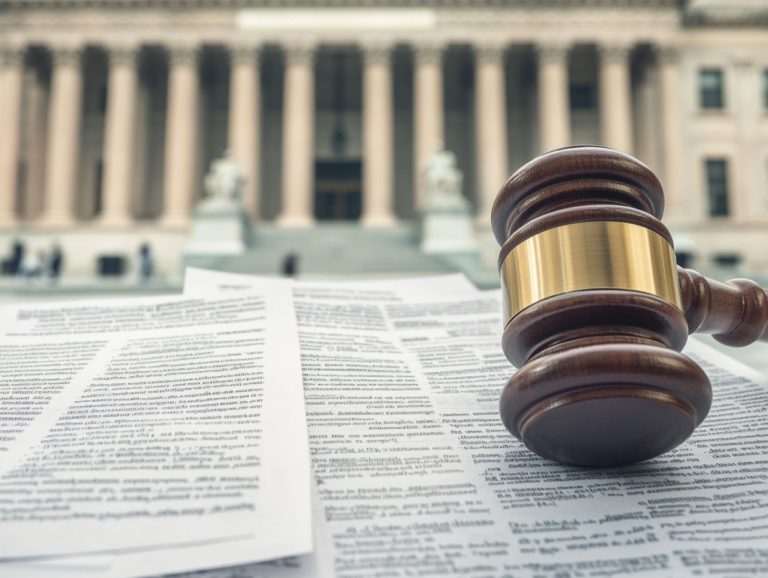What Are the Criteria for Bail Release?
Navigating the bail system can feel overwhelming, especially if you or someone close to you is facing legal challenges.
This guide covers the essentials of bail release. You’ll learn about factors that influence bail decisions, such as the crime’s severity and flight risk, along with the various types of bail available.
Discover what to expect during a bail hearing and how to appeal a denied bail request. Understanding these aspects helps you make informed choices during this challenging time.
Contents
- Key Takeaways:
- The Basics of Bail Release
- Factors Considered for Bail Release
- The Bail Hearing Process
- Types of Bail Release
- Challenging Bail Release Decisions
- Frequently Asked Questions
- What Are the Criteria for Bail Release?
- Can anyone be eligible for bail release?
- What is considered a “flight risk” in terms of bail release?
- How do I prove to the court that I am not a flight risk?
- Can bail be denied even if all the requirements are met?
- Is the bail amount based on the requirements for release?
Key Takeaways:

Factors such as the severity of the crime, criminal history, and flight risk are considered for bail release. Cash bail, property bond, and personal recognizance are types of bail release options that may be granted. If bail is denied, you can appeal the decision through the bail hearing process in court.
The Basics of Bail Release
Bail release is essential in the criminal justice system. It allows you to secure your freedom while awaiting trial.
In Tampa, the bail process includes several key elements:
- Conditions of bail
- Types available, such as cash bail and personal recognizance
- The defense attorney s role in achieving the best possible outcome
These factors affect not just your court appearance but also community ties and public safety, particularly due to Federal Bail Reform initiatives.
Understanding the Bail System
Understanding the bail system is vital for navigating criminal charges. Your financial resources can significantly affect your release.
Different types of bail exist. For instance, cash bail requires you to pay a specific amount to secure your release. Alternatively, bail bonds require a company to pay for your release if you don t show up in court.
Prioritize your court appearances! Failing to show up can lead to losing your bond and other severe consequences.
Risk assessment plays a crucial role. This informs judges about the risks of re-offending or fleeing, impacting your eligibility for bail and release conditions.
Understanding these dynamics empowers you to make informed decisions during a challenging time.
Factors Considered for Bail Release
Several factors influence bail conditions for defendants facing felony cases. These include your criminal history, assessed flight risk, and community ties.
Severity of the Crime
The severity of the crime is a key factor. Felony cases often lead to stricter conditions to ensure public safety and the defendant’s accountability.
Misdemeanors, being less serious offenses, usually come with more lenient bail conditions.
Judges consider the nature of the charges. If you re facing felony charges, expect higher bail amounts or even a denial due to the serious allegations and potential prison time.
Grasping these distinctions is essential as they significantly influence judicial decisions and impact defendants’ lives during the legal process.
Criminal History

A defendant’s criminal history is crucial for your risk assessment. It directly influences the conditions of bail and the potential for bond forfeiture if they fail to appear in court.
Judges often consider past offenses to assess the likelihood of reoffending or skipping court dates. This is vital for maintaining public safety.
If there s a pattern of previous convictions, courts may impose stricter bail conditions. This ensures that only those deemed low-risk benefit from more lenient options.
This upholds accountability and fosters trust in the judicial system.
When defendants forfeit their bonds, the repercussions can go beyond financial losses. They can jeopardize community safety and strain law enforcement resources.
This fact highlights the urgent need for balancing individual rights with public safety.
Flight Risk
Assessing a defendant’s flight risk is essential for determining bail conditions. Strong community ties can serve as a helpful reason that supports pretrial release.
When evaluators look at a defendant, they often consider their history of complying with previous legal obligations. This includes attending court hearings and following probation terms.
If you can demonstrate a consistent pattern of responsibility, you re generally seen more favorably regarding your flight risk.
Having family, stable employment, or other community ties can significantly enhance your stability. This suggests you re less likely to flee.
These assessments are pivotal in shaping the bail process and ultimately influence the judge s final decision on your potential release or the imposition of restrictive conditions.
The Bail Hearing Process
The bail hearing process is crucial this is where your future is decided! A judicial officer meticulously assesses the conditions of bail.
During this stage, decisions are made based on the evidence presented in the requisite hearings. This shapes the trajectory of the case at hand.
What to Expect in Court
When you appear in court for a bail hearing, be prepared for a thorough review of your criminal charges and the bail conditions that the judicial officer may impose.
During this phase, it s vital to recognize the pivotal role your defense attorney will play. They will advocate for favorable bail conditions and argue for your release.
Your attorney will likely present compelling evidence that underscores your ties to the community, lack of a criminal history, or other helpful reasons that bolster your case.
The prosecution may introduce counterarguments, aiming to justify a higher bail or even your detention before trial.
Expect the judicial officer to weigh these arguments carefully. The potential outcomes could range from being granted bail with specific conditions to remaining in custody until your trial, depending on the nuances of your case.
Types of Bail Release
You will find several types of bail release mechanisms at your disposal. These include cash bail, bail bonds, and personal recognizance (a promise to appear in court without bail).
Each option comes with its own set of distinct conditions that dictate the terms of a defendant’s freedom prior to trial.
Cash Bail

Cash bail requires you to pay a specified amount upfront to secure your release. This can lead to bond forfeiture if you don t comply with the conditions set by the court.
This financial mechanism, while designed to ensure that you appear in court, often burdens individuals who lack the resources to pay. This can result in prolonged incarceration for those unable to afford even a moderate bail amount.
To navigate this challenging system, you might seek out bail bondsmen. They charge a non-refundable fee typically a percentage of the total bail enabling you to secure your freedom without the need to pay the full amount upfront.
However, if you fail to meet court appearances or violate any bail conditions, the consequences can be severe. The bond could be forfeited, leading to additional financial instability and more legal complications.
Property Bond
A property bond allows you to use real estate or other valuable assets as collateral for your bail, as long as it meets specific conditions set by a supervision officer.
This option can provide significant financial relief, especially if you lack the funds for cash bail.
When considering a property bond, ensure the property’s value exceeds the bail amount, taking into account any liens or debts. Supervision officers evaluate the property’s worth and determine its eligibility, ensuring security in the arrangement.
These officers also monitor your compliance with court conditions, which may include regular check-ins and travel restrictions. Property bonds offer a valuable solution for those struggling with cash bail.
Personal Recognizance
Personal recognizance lets you be released without cash or property, relying on your community ties to ensure compliance with court conditions. This approach is based on the idea that individuals with strong connections like stable jobs, family support, and local residency are less likely to skip their court date.
Courts assess these connections when determining your eligibility for personal recognizance. While this release doesn t require monetary payment, it usually comes with specific conditions, such as:
- Attending all court appearances
- Avoiding contact with victims
- Sticking to a curfew
By following these stipulations, you show your commitment to the legal process and the importance of community support in navigating legal challenges.
Challenging Bail Release Decisions
If your bail request is denied, you can challenge the decision. This process opens avenues for appealing the denial and addressing bond forfeiture risks.
Appealing a Denied Bail Request
Appealing a denied bail request involves presenting your case to a judicial officer. They will review the bail conditions and reasons for the initial denial during court proceedings.
To navigate this effectively, gather compelling evidence that contradicts the original decision. A defense attorney plays a vital role in organizing relevant documents and testimonials while clearly articulating your legal arguments.
This collaboration can significantly influence your appeal’s outcome. A well-prepared case may lead the judicial officer to reevaluate the decision, prioritizing fairness and justice.
Frequently Asked Questions

What Are the Criteria for Bail Release?
The criteria for bail release vary by jurisdiction but generally include the crime’s severity, the defendant’s criminal history, and whether they are viewed as a flight risk or a danger to the community.
Can anyone be eligible for bail release?
In most cases, anyone arrested and awaiting trial can be eligible for bail release. However, some exceptions exist, such as when a person is charged with a capital offense or has a history of skipping bail.
What is considered a “flight risk” in terms of bail release?
A flight risk is a person who might leave the area or skip court if released on bail. Factors contributing to this designation include ties to other countries, previous attempts to flee, or a lack of stable employment or residence.
How do I prove to the court that I am not a flight risk?
You can demonstrate to the court that you are not a flight risk by providing evidence of strong community ties, such as family, employment, or property ownership. A history of attending court hearings and complying with legal obligations also helps.
Can bail be denied even if all the requirements are met?
Yes, a judge can deny bail even if all requirements are satisfied. This may occur if the judge believes the defendant poses a danger to the community or might flee.
Is the bail amount based on the requirements for release?
Yes, the bail amount is usually set considering the seriousness of the crime and the risks involved. Serious offenses or high risks typically lead to higher bail amounts, but the defendant’s financial situation also plays a role.






